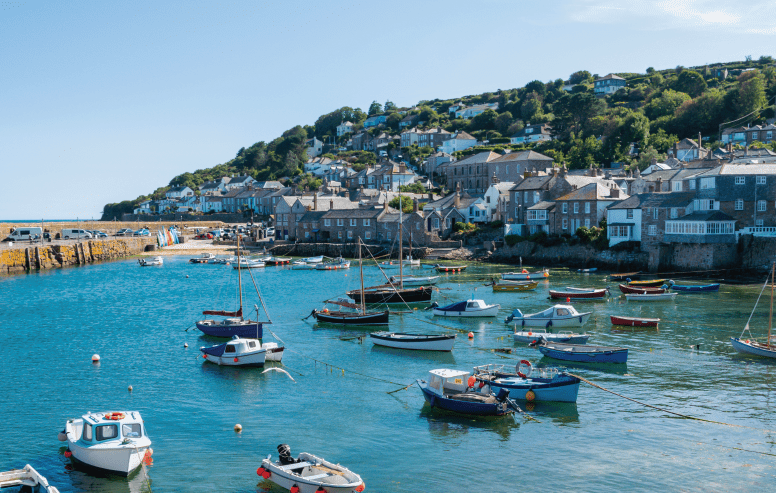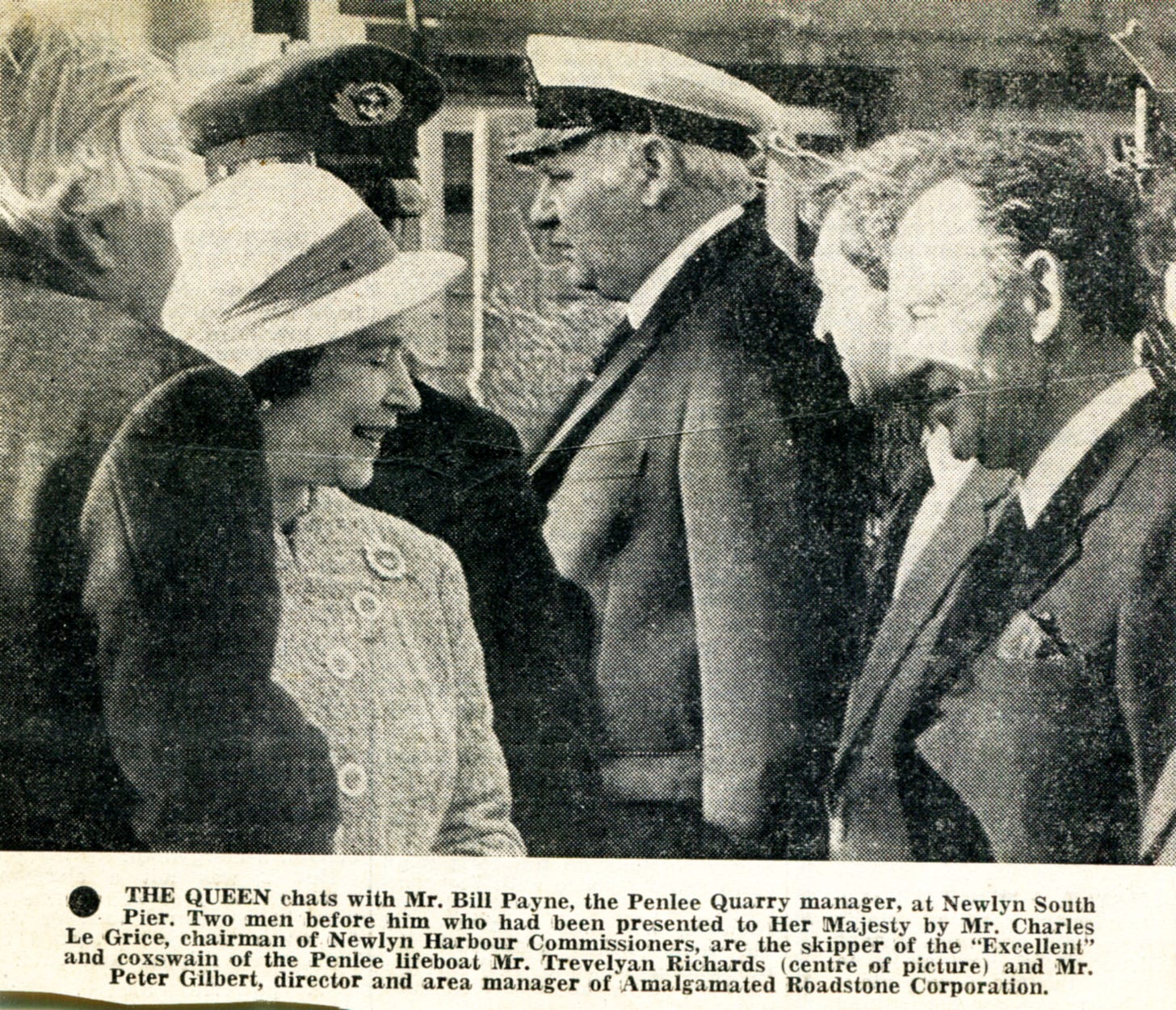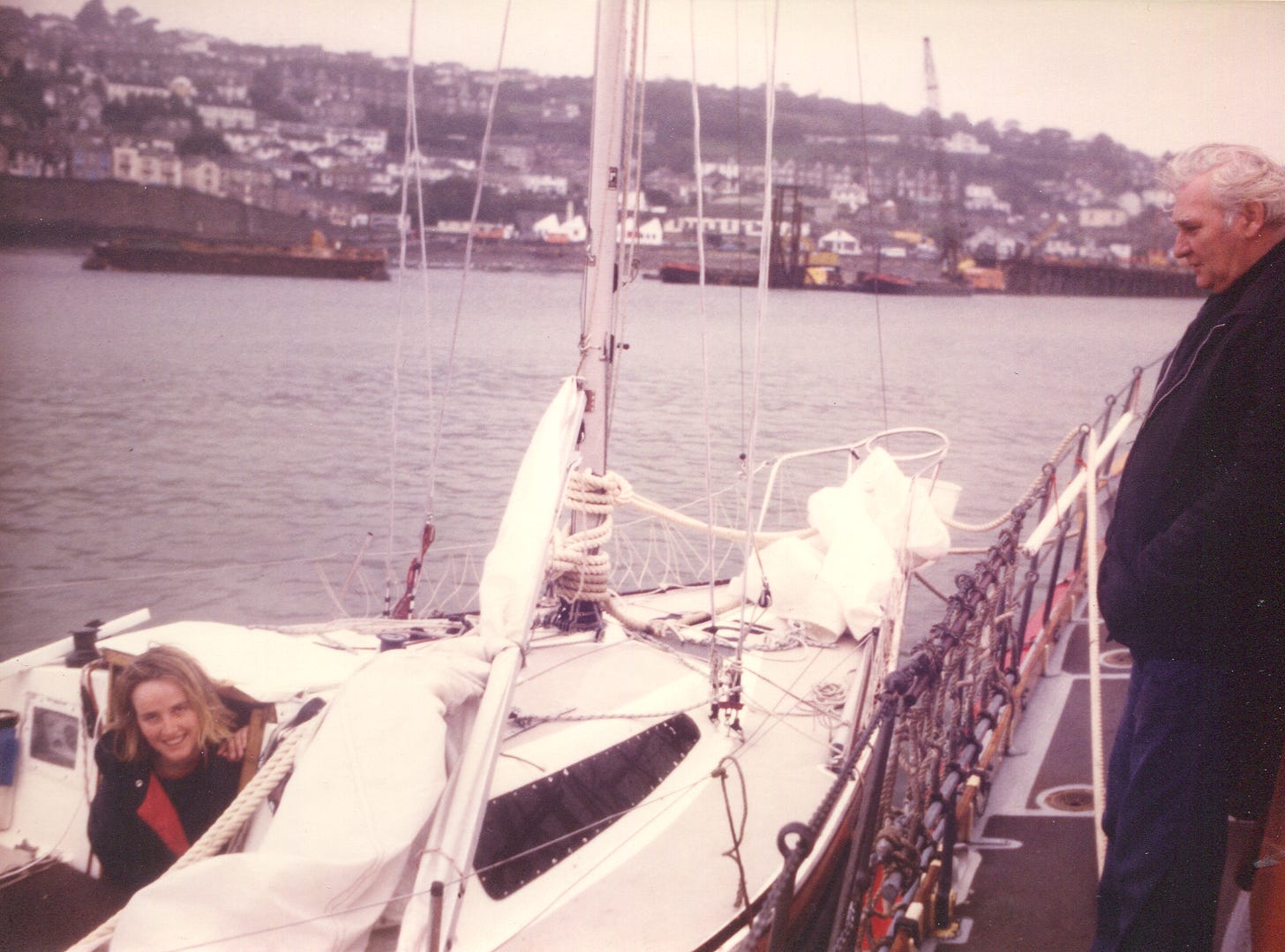"Thar Be the Ship Inn, Favored by Locals"
In other words, Mister tourist, it's politely suggested that you avoid going there.

You drive around a turn in the narrow road one morning and suddenly you’re stunned by the beauty of a little seaside town. There in front of you is a piece of historic England with its ancient, stone houses and narrow streets and a miniscule harbor filled with colorful, small boats. So you park on the quay overlooking the water and just soak it in. It’s too lovely to continue and, besides, you’d have no idea how to get out of there once you actually drove in.
That’s how it was when I stepped out of the rental car in Mousehole to take pictures. There was an old fisherman working on some netted crab pots nearby and I walked over to ask where I might get lunch. He pointed across the tiny harbor to a waterfront restaurant.
“Thar be the Lobster Pot” he replied. “It’s pop’lar with tourists. And thar, just across the street, be the Ship Inn, favored by the locals. You might wish not to go thar but they do draw a good pint.”
I knew then exactly where I’d go.
A little bell jingled over my head as I walked through the door and into a world as old as the Roman Empire in Britain, with shaded lamps on tables, exposed stone walls, worn wooden floors, the aromas of beer and tobacco smoke and small groups of people engaged in revealing the world to one another over tall glasses of amber beer. Near the bar was a gathering of rowdy men, pint glasses in hand, no doubt fishermen, all apparently laughing in unison.
It was that laughter which captivated anyone around those fellows and which certainly captivated me. One of them would tell a story about another in the group as they all listened intently. Then somebody else would throw in a punch line and they’d all explode laughing their heads off. This would then be repeated again and again. They spoke in a Cornish dialect which, although difficult for my Alabama ears to process, couldn’t stop me from laughing right along. I couldn’t help it. It seemed the most profoundly hilarious thing I’d ever witnessed.
After maybe 20 minutes of this I gave the pub’s owner, who was also the barmaid, sufficient bills to buy each of those seven guys a beer. When she did they all went silent and turned to stare at me. I raised my glass slightly, feeling keenly embarrassed. They all raised a glass in return, giving me hope that I might survive. Then it was back to verbal dueling and the laughing of heads off.
My glass was nearly empty when the barmaid took it from my hand and calmly began filling it. I felt the firm nudge of an elbow in my back.
“Drink up, yank,” said a big man standing beside me, one hand buried in his peacoat, the free one encircling a pint. “Yer first visit?”
“Yes it is,” I responded, intrigued by his size and his mantle of saltiness, “and thanks for the ale.”
“Best pint ‘o bitter in Cornwall and you can bloody well swear to that.”
Trevelyan Richards, I soon found out, was the crustiest of Mousehole’s crusty sea dogs —- a fisherman, following in the way of his ancestors and also the captain of the local rescue lifeboat, the Solomon Browne. His buying that glass of ale for me was as good as a letter of introduction from the Queen, herself and I found myself immediately welcomed into the community. But denied the privilege over the next three days of paying for another single glass of ale.

I also discovered that the men around Trevelyan were members of the lifeboat crew, a voluntary service sponsored by the Royal National Lifeboat Institution (RNLI), a world-renowned charitable organization dedicated to saving lives at sea. These guys are the New York Yankees of sea rescue with a long record of amazing rescues in stormy seas.
In fact, that very night, after an afternoon spent touring the hills and moors of western Cornwall, I stood listening to colorful conversation back at the Ship Inn when a distress call came in over the pub’s RNLI radio of a yacht adrift in rough seas with a broken boom. The boat was seventeen miles offshore, it was very dark outside, you could hear the wind scream everytime somebody opened a door. Trevelyan and his crew hurriedly left their glasses on the bar and sped away to launch the lifeboat.
Everybody in the pub gathered around the bar, listening to static-punctuated talk coming in over the short wave radio. I remember feeling troubled for the safety of my new-found friends as the bar closed and I walked in the darkness to my room next door.

The next morning brought relief. Trevelyan invited me to go with him to Newlyn and meet the sailor they rescued the previous night. She was a brave sailor, indeed, attempting to sail single-handedly from the south coast of England, across the Bay of Biscay all the way to Santander, Spain. She also was incredibly lucky.
The ship Inn apparently dates back to 1849 and was the favorite watering hole of Welsh poet Dylan Thomas, who called Mousehole “the loveliest village in all of England.” Like a great many pubs across the British Isles, this one is more than simply a bar but an extension of the family circle, which can include friends one may have known since childhood.
Pronounced locally as a term resembling “muzzle”, Mousehole is a village where you know everybody and familial memories stretch across generations. The Saturday night before I was scheduled to catch the train back to London, Ship Inn’s owners, Mary and Charlie Greenhaugh and Trevelyan and a group of the pub’s regulars and crew members stood with me on the quay and watched a yellow full moon rise above the little harbor.
“You’ll be back, won’t you, Bob?
“Yes, of course.”
“You’ve got a room at my house anytime.”
“Mine, too. Don’t you forget.”
Trevelyan asked me to go to church with him and his aged mother the next morning. I said I would join him early at his house. I did. We had a shot of scotch, neat, and then said goodbye.
It was just a year year after my experience at Mousehole and the swapping of numerous letters across the Atlantic with Trevelyan, that I heard on the radio on Chrismas Eve, 1981, that the Solomon Browne with all its crew had gone down in a December hurricane on the 23rd, during an attempted rescue.
They called it “the night Mousehole died”. I was lucky to have taken pictures of the ship’s crew who lost their lives and sent enlargements back to the families. They were truly remarkable men and they will be well remembered for a very long time.
Within 24 hours of the disaster enough local men had volunteered to form a new lifeboat crew.
It was a major event, not just in Cornwall but across the British Isles and I felt very fortunate to have known such men if even for the short time that I was there with them.
Thank you!
Bob











I’m in tears. What a beautiful and sad story.
Joanie